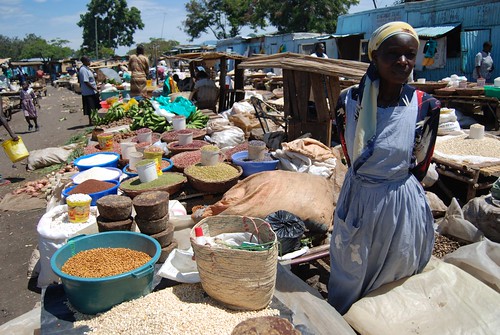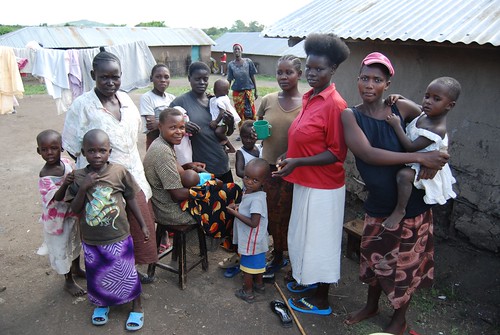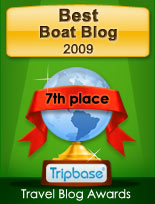Posts from — September 2008
Worlds Apart
Lake Victoria is a nice 10-minute walk from the front door of my friends’ house. On this casual stroll I met a woman. She was preparing a meal outside, so I struck a conversation. “Why don’t you talk like your friends?” She asked, referring to my American friends who had the Kenyan dialect dialed in. I summoned my best impression and made instant friends.
She was a widow, as was her sister who lived in the house 10 feet from hers. Both had several children. She introduced me. Several of the children were dressed in school uniforms, which, guessing by the worn look, had been passed down from the previous. The others were either too old or young or unlucky enough to afford an education. She grabbed a chair from inside her small two-room house, and placed it in the shade, where she invited me to sit as she blew and fanned the coals that cooked her vegetable root.
It was remarkable how freely the children spoke of their condition. They shared their names, their age and relation. They told me what they wanted to do in life (mostly become doctors and a couple-teachers). They told me of their father who died a few years ago and pointed to a small mound, not far from the walls of their house. “My dad died around that time too,” I shared, hoping to connect in their loss. But strangely there was little sense of loss. There were simply facts, reality.
It’s a reality we are shielded from in the United States. Of course there is tragedy in both places, but in the U.S., death sits on the curb like a homeless man. We see it out of the corner of our eye. We turn our heads, and avoid contact as we side step over the obvious, pretending it doesn’t exist. Then once it’s far enough behind us, we raise our heads and resume conversation, as though nothing happened.
But in Africa, when HIV infects up to 40% of your population, and when malaria is more common than the common cold, death is a part of life-it is reality. We talked shortly of the children’s father, and moved on. The mother would fan the flame, then stir the pot, then tend to the toddler who wandered naked as the day. Then return to conversation, smiling, interjecting. Each kid had questions, fascinated with me and my camera. Each gathering close after every shot, giddy to see their digital reflections.
“I want to talk to you about America,” said one boy. You could see his mind search for questions. “Tell me about it… is it true you have machines that wash your clothes?” “We even have machines that wash our dishes, even dry our clothes.” “Machines to dry your clothes?!” Said the mother unsure. “Machines do everything for you,” the boy replied distantly, imagining what must have been a futuristic scene. We laughed and joked as our questions painted pictures of two totally different worlds.
One girl commented on white girls not being able to carry things on their heads, a skill used daily here. Another boy analyzed my arms, then deducted that white people must need more hair on their bodies because it is so much colder where we come from. I asked about African dancing, suggesting we have a dance party sometime. I commented on the fact that no one walked around at night, explaining how much I love roaming streets by the light of the city. “There are entire cities with lights?” asked a boy, baffled by a place where more than just a few houses had power.
There wasn’t much food but the mother insisted I not only eat, but also take some back to my friends. I ate bananas that tasted like potatoes, and potatoes sweeter than bananas. Then with the light beginning to change I shook hands and thanked them for their hospitality. “I hope I will see you again,” said the boy most interested in my American life.
“I’m sure we will.” I smiled and started back up the rocky path to my friends’ house.
September 19, 2008 No Comments
A Different Life
 From Kisumu, Mbita it doesn’t look very far on a map, and really it wouldn’t be if traveling by private car on paved road. Unfortunately neither were available. My trip began early in the morning, making my way through Kisumu’s largest market. The smell of dried fish swam through the muggy air. Each booth beckoned offering a different product, from spices to colorful fabrics to cheap plastic flip flops which adorn the soles of many.
From Kisumu, Mbita it doesn’t look very far on a map, and really it wouldn’t be if traveling by private car on paved road. Unfortunately neither were available. My trip began early in the morning, making my way through Kisumu’s largest market. The smell of dried fish swam through the muggy air. Each booth beckoned offering a different product, from spices to colorful fabrics to cheap plastic flip flops which adorn the soles of many.
At the opposite end sits a large lot, where dust rises like smoke from the shuffling feet of bodies bound for different destinations. I find the bus, toss the bags on top, and fill the first available seat. Within minutes every space was occupied both sitting and standing. Cramped, smelly, hot, the bus starts down a road that would get progressively worse over the next several hours. The ride was not too eventful. An occasional stop, wherein a few people would shuffle off, a few on, a kind old lady or young man would approach the window offering a cob of corn while I reminisced the days of air conditioning and deodorant.
 Hours later the bus pulls to its final stop. Following the queue of passengers, I exit, collect and dust off my bag, then wander to the edge of Lake Victoria for the final leg of my trip. The water taxi is little more than a long slender canoe with a motor. You can get to Mbita by bus but to do so would add several additional hours, so I joined about 30 others in the rickety boat sitting inches from the wet murky cloud looking for hippos.
Hours later the bus pulls to its final stop. Following the queue of passengers, I exit, collect and dust off my bag, then wander to the edge of Lake Victoria for the final leg of my trip. The water taxi is little more than a long slender canoe with a motor. You can get to Mbita by bus but to do so would add several additional hours, so I joined about 30 others in the rickety boat sitting inches from the wet murky cloud looking for hippos.
Mbita is a fishing community dependant like so many others on Africa’s largest lake. Resting on the equator it is the second widest lake in the world and the source of the world’s longest river-the mighty Nile, which stretches 4,132 miles before losing itself into the Mediterranean Sea. Millions of Africans from the three bordering countries depend on it to exist and as such it has been over fished and polluted.
Mbita is just one of those villages. I walked with my old friends who had relocated from comfortable Flagstaff, Arizona years ago, through the small dirty streets of the village. “This is where you can check your email…This is where we usually buy our vegetables…We can buy bread from our neighbors.” They pointed out shack after shack on the way to their house.
Their house was made of brick with a tin roof, making it one of the nicest in the neighborhood. They were some of the few fortunate to have a shower that trickled water, and a single outlet offering power inconsistently throughout the day. There was no refrigerator, no oven, no toilet. To cook they use a propane tank fueling a single burner.  When nature calls there is set of covered holes, shared by several houses, sitting 40 yards away. It is a different life, where in America the living situation would be considered impoverished, unlivable even. But here in Mbita, you look around and consider yourself blessed.
When nature calls there is set of covered holes, shared by several houses, sitting 40 yards away. It is a different life, where in America the living situation would be considered impoverished, unlivable even. But here in Mbita, you look around and consider yourself blessed.
That night with a cool breeze caressing my face, I stood outside the door looking into the dark peaceful distance. Lights sparkled across the horizon. “Do like our view of the city lights?” My friend J.P. asked. “It’s really cool,” I replied not realizing he was joking. The sparkling lights were from lanterns but not from the city. It was the lake. Hundreds and hundreds of fishermen scattered across the darkness like fallen stars. Floating lanterns beckoned bugs that lured the fish that would feed their families. This was life. And it was different life than any I’d seen before.
September 10, 2008 No Comments





